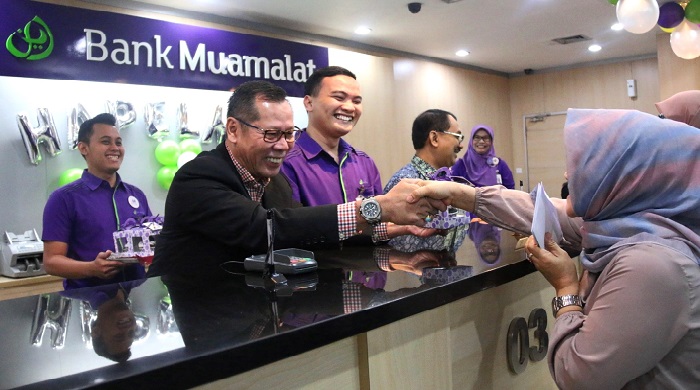Indonesia Goes Chip with OpenWay
Bank Muamalat Indonesia (BMI) is now fully compliant with the National Standard Indonesian Chip Card Specification (NCICCS) on both the issuing and acquiring side with the support of OpenWay.
Bank Muamalat Indonesia (BMI), one of the leading Islamic banking providers in the country, is now fully compliant with the National Standard Indonesian Chip Card Specification (NCICCS) on both the issuing and acquiring side. This is a government requirement to improve card security and the customer payment experience in Indonesia. The project was completed with the support of OpenWay, ranked #1 by Gartner in digital payment software solutions and a leader in digital wallets by Ovum, whose Way4-branded card processing solutions BMI uses.
Now BMI can offer its customers chip debit and ATM Visa cards. OpenWay helped make this possible by supporting issuance of dual application cards – international VSDC (Visa) and domestic NSICCS – and setup of 6-digital online PIN in the Way4 processing system. BMI can also service NCICCS-compliant cards across its ATM and POS networks.
“Providing excellent banking services is the number one priority for BMI. We believe that the new card standard enables us to provide a higher level of cardholder protection against fraud, thus improving the customer experience and reducing bank’s losses from unauthorized transactions with stolen or lost cards. The support of the OpenWay team in the NCICCS certification process helped us to overcome technical challenges and complete the project faster”, – Saladin Effendi, Head of IT Division of Bank Muamalat Indonesia
“OpenWay has participated in national projects of different sizes, from enabling compliance with national card standards and connection to domestic payment gateways to developing and implementing end-to-end national and interbank switching platforms. We are always ready to support payment institutions in Indonesia and Asia-Pacific build secure and seamless digital payment ecosystems”, – says Rudy Gunawan, Managing Director, OpenWay Asia.
NSICCS is a national standard for chip cards which Bank Indonesia has nominated as the payment technology benchmark for all ATM and debit card providers in the country. The goal is to upgrade of national payment system to an international level of security and to mitigate fraud risk. Adoption of NSCCS is one of the phases in the implementation of the National Payment Gateway aimed to strengthen the independence of the Indonesian payment system and increase interoperability between all payment instruments and channels in the country.
About BMI
PT Bank Muamalat Indonesia Tbk (“Bank Muamalat Indonesia”) commenced its journey as the first Sharia bank in Indonesia on November 1, 1991, or Rabi’us Tsani 24, 1412 H. The establishment of Bank Muamalat Indonesia was instigated by Indonesian Council of Ulema (MUI), the Association of Indonesian Moselm Inttelectuals (ICMI) and local moslem businessmen who later gained supports from the Government of Republic of Indonesia. Since it officially began operating on May 1, 1992 or Syawal 27, 1412 H, Bank Muamalat Indonesia keeps on innovating and releasing sharia financial products such as Sharia Insurance (Asuransi Takaful), Muamalat financial institution pension fund (DPLK Muamalat) and sharia multifinance company (Al-Ijarah Indonesia Finance), all of which are breakthroughs in the country. In addition to these, Banl’s product Shar-e launched in 2004 which was also the first instant saving in Indonesia. The Shar-e Gold Debit Visa launched in 2011 obtained an award from the Indonesian Museum of Records (MURI) as the first Sharia Debit Card with the chip technology in Indonesia; as well as a comprehensive e-channel services such as internet banking, mobile banking, ATM and cash management services. All these products are pioneers of sharia products in Indonesia and have become the most significant milestone in sharia banking industry.
As there is more acknowledgment on the Bank’s capacity, Bank Muamalat Indonesia expanded its business by adding more branch offices all over Indonesia. In 2009, the Bank obtained a license to operate a branch office in Kuala Lumpur, Malaysia and become the first and still only bank in Indonesia to expand its business in Malaysia. To date, the Bank has operated 325 offices to serve its customers including 1 (one) branch office in Malaysia. The Bank operation is also supported by a wide service network consisting of 710 unit of Muamalat ATMs, 120,000 ATM Bersama and ATM Prima Networks, and a network of more than 11,000 ATMs in Malaysia through Malaysia Electronic Payment (MEPS).

